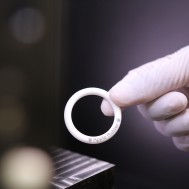Manufacturers are increasingly requiring identification marks on their products to help with traceability. While the traditional marking method is typically ink printing, this method is becoming outdated, especially in the medical industry as ink can often be easily removed, altered, or contaminated. That’s why many manufacturers have begun to use ultraviolet lasers to mark their products.
Laser marking makes it easy to identify parts and authenticity without a physical tool etching the surface of the part or transmitting any substances onto the surface. Instead, the laser light is focused onto a material, producing damage-free, easy-to-read marks. Apple Rubber uses laser marking to add model numbers, bar codes, logos and more onto customer’s o-rings and seals.
Here are the top four benefits of utilizing UV laser marking in your manufacturing facility:
1. Flexible processing
Laser marking can be used on many products in a variety of industries, including aerospace, automotive, defense DOD, medical and electronic components. Apple Rubber uses laser marking on virtually any o-ring or seal where product identification is required.
In many industries, product authenticity and traceability is required by law. Automotive companies, for example, use part traceability to quickly determine when and where the part was produced in the case of component failure, which helps for product recalls. Because of the importance of product identification, using a flexible and reliable marking technique is critical.
2. Overall speed
In traditional ink marking, printing equipment is often mechanically complex, requiring longer downtimes for maintenance and frequent cleanings. With UV laser marking, there is no prolonged downtime associated with cleaning or fixing a printer, and the overall engraving process is extremely quick and simple.
UV lasers are better absorbed than other wavelengths and marking techniques by virtually all materials, requiring less power to produce a clear mark. This makes the process even simpler since UV laser marking ensures a high-quality, high-contrast mark in one application.
3. Maximizes authenticity
UV lasers create easy-to-read marks that are far superior to printed marks or labels. Apple Rubber uses a high-quality laser that can focus in on smaller spot sizes and produce a high peak power, leading to crisp, clear marks on o-rings and seals. This ensures that parts can be clearly identified and their markings cannot be altered or tampered with.
In the pharmaceutical industry, counterfeiting has become a huge issue with many social and economic implications. Since pharmaceutical manufacturers are limited in what types of markings they can use, they must choose an option that is tamper-proof, easy to read, compatible with their specific environment and cannot alter the product. Because of these requirements, laser marking is the best choice in this industry and many others that require complete authenticity in their products.
4. Minimizes contamination
While the ink in traditional marking methods is non-toxic, the printing equipment often utilizes lubricants and solvents that can become airborne and contaminate printed products. Medical manufacturing often requires completely sterile products that must be produced in a classified cleanroom. In this case, traditional marking would not be acceptable.
During the laser marking process, the marking device does not come into direct contact with the product, allowing for clean operation with minimal contamination. This creates a product identification option for industries that require sterile products and ensures that outside materials will not cause future contamination of a product.
Want to talk more about laser marking?
Tweet us @AppleRubber to continue the conversation.
